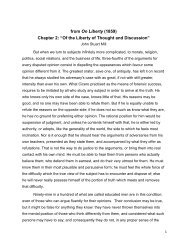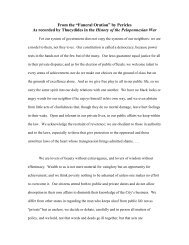Rousseau_contrat-social
You also want an ePaper? Increase the reach of your titles
YUMPU automatically turns print PDFs into web optimized ePapers that Google loves.
of sacrilege, and not the conquest of unbelievers.<br />
44. It should be noted that the clergy find their bond of union not so<br />
much in formal assemblies, as in the communion of Churches. Communion<br />
and excommunication are the <strong>social</strong> compact of the clergy, a compact<br />
which will always make them masters of peoples and kings. All priests<br />
who communicate together are fellow-citizens, even if they come from<br />
opposite ends of the earth. This invention is a masterpiece of<br />
statesmanship: there is nothing like it among pagan priests; who have<br />
therefore never formed a clerical corporate body.<br />
45. See, for instance, in a letter from Grotius to his brother (April<br />
11, 1643), what that learned man found to praise and to blame in the De<br />
Cive. It is true that, with a bent for indulgence, he seems to pardon<br />
the writer the good for the sake of the bad; but all men are not so<br />
forgiving.<br />
46. "In the republic," says the Marquis d’Argenson, "each man is<br />
perfectly free in what does not harm others." This is the invariable<br />
limitation, which it is impossible to define more exactly. I have not<br />
been able to deny myself the pleasure of occasionally quoting from this<br />
manuscript, though it is unknown to the public, in order to do honour to<br />
the memory of a good and illustrious man, who had kept even in the<br />
Ministry the heart of a good citizen, and views on the government of his<br />
country that were sane and right.<br />
47. Cæsar, pleading for Catiline, tried to establish the dogma that the<br />
soul is mortal: Cato and Cicero, in refutation, did not waste time in<br />
philosophising. They were content to show that Cæsar spoke like a bad<br />
citizen, and brought forward a doctrine that would have a bad effect on<br />
the State. This, in fact, and not a problem of theology, was what the<br />
Roman senate had to judge.<br />
48. Marriage, for instance, being a civil contract, has civil effects<br />
without which society cannot even subsist. Suppose a body of clergy<br />
should claim the sole right of permitting this act, a right which every<br />
intolerant religion must of necessity claim, is it not clear that in<br />
121











